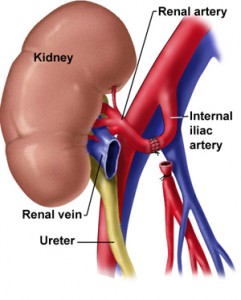
Renal transplantation is the treatment of choice for a minority of patients with end-stage renal disease (ESRD). Most adult patients with ESRD are never referred for evaluation for transplantation, and have a 70% 5-year mortality on dialysis. Marked improvements in early graft survival and long-term graft function have made kidney transplantation a more cost-effective alternative to dialysis. In the United States, over 375,000 kidney transplants have been performed, and in 2012, 191,400 patients were alive and with a functioning transplanted kidney. currently, more than 101,000 patients are waiting for kidney transplants.
Kidney Disease
When the kidneys stop working, renal failure occurs. If this renal failure continues (chronically), end-stage renal disease results, with accumulation of toxic waste products in the body. In this case, either dialysis or transplantation is required.
Common Causes of End-Stage Renal Disease
- Diabetes mellitus
- High blood pressure
- Glomerulonephritis
- Polycystic Kidney Disease
- Severe anatomical problems of the urinary tract
Kidney Transplantation
The Living Donor
Sometimes family members, including brothers, sisters, parents, children (18 years or older), uncles, aunts, cousins, or a spouse or close friend may wish to donate a kidney. That person is called a “living donor.”
Deceased Donor
A deceased donor kidney comes from a person who has suffered brain death.
Transplant Evaluation Process
Regardless of the type of kidney transplant-living donor or deceased donor-special blood tests are needed to find out what type of blood and tissue is present.
[/ultimate_heading]


